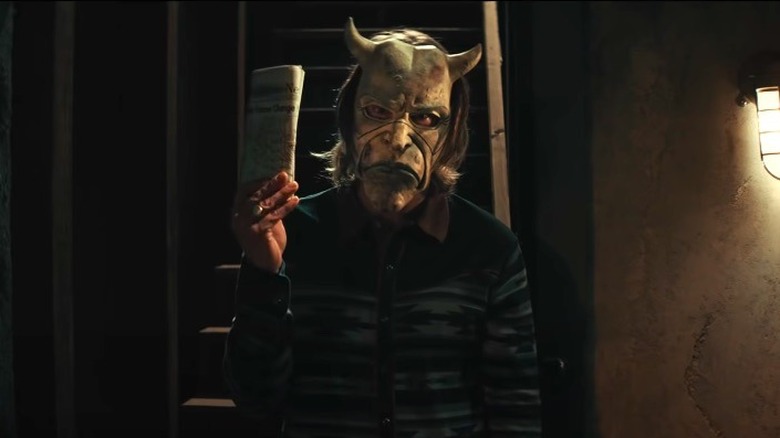How Stephen King Is Connected To The Black Phone
Over the course of his decades-long career, Stephen King has written or co-written more than 60 novels, a great many of which have gone on to be adapted for film, television, or both. His first novel, "Carrie," was published in 1974 and has since been adapted for the big screen two times. The first (and easily the most well-known) adaptation is the 1976 feature film of the same name starring Sissy Spacek as the title character and directed by masterful auteur Brian De Palma.
From there, King's novels continued to make their way to the screen, with one of the most notable examples being "The Shining," King's unsettling 1977 book adapted for the screen by director Stanley Kubrick, who co-wrote the screenplay with Diane Johnson. Following the film's release in 1980, it went on to be recognized as one of the best horror films of all time. Other notable King stories that have become staples of the horror film genre include "It," "Misery," and "Doctor Sleep," the latter of which is a sequel to "The Shining." All in all, there are over 40 adaptations and counting of King's works that have been made over the years (via CinemaBlend).
If you've seen the trailer for the horror film "The Black Phone" (via YouTube), you know the plot centers on an abducted young teen (Mason Thames) who discovers he can communicate with the victims of his kidnapper (Ethan Hawke) through a mysterious black phone in the basement where he is being held hostage. To seasoned fans, the premise feels a lot like it may have originated from a King novel or short story. However, "The Black Phone" is not a King adaptation, but the famous horror writer does have a very direct connection to the project.
The Black Phone is adapted from a short story written by King's son
"The Black Phone" is indeed based on a short story — just not one written by Stephen King. Rather, it was penned by King's son, Joe Hill, who, per his official site, has published four novels, several short story collections, and multiple comics. "The Black Phone" appears in the short story collection "20th Century Ghosts," published in the U.S. in 2007 (via Goodreads). Not only did Hill follow in his father's footsteps by becoming a novelist (and one who has had his works, including "Locke & Key," adapted for the screen), but Hill and King have even collaborated together on a few short stories.
During a 2019 interview with Wisconsin Public Radio, Hill discussed what it was like to work with his very famous father — and he used a cartoon to paint the picture of what their collaboration looks like. He said, "You ever see any of those 'Roadrunner' cartoons? So, basically, imagine Wile E. Coyote getting a box that says 'Acme' on the side. And then he pulls apart the crate, and inside, there's a rocket. And he lights the fuse and climbs on top. And the rocket blasts off after the roadrunner. And Wile E. Coyote is hanging on top, barely clinging on for dear life. I've written with my dad on two short stories, and both times, I felt like Wile E. Coyote hanging on to the rocket."
Hill also revealed something about his craft that he learned from King: Oftentimes, it's best to provide a reveal rather than keep something mysterious. He said, "The reader does deserve some revelation, some understanding of what it was all about, and that maybe the monster does have to come out from under the bed."
King's It also has an indirect connection to The Black Phone
While speaking with Vanity Fair about the adaptation of "The Black Phone," Joe Hill revealed that the film's screenwriters, Scott Derrickson (who also directed) and C. Robert Cargill, didn't change much while adapting the short story for the screen — except for one key line. Hill explained, "The big change is that in the movie, he says, 'I'm a part-time magician.' But in the short story, he says, 'I'm a part-time clown.' It isn't that hard to understand why we made that change."
The reason is, of course, the fact that an evil clown who targets children as his victims was already made famous in Stephen King's "IT" through the Pennywise character. Hill told Vanity Fair that when he wrote "The Black Phone," it had been decades since he had read his father's novel (which just so happens to be dedicated to Hill and his two siblings) and about 15 years since he had watched the 1990 two-part television adaptation of it. As such, his use of "clown" was a mere coincidence. The author continued, "What I was thinking about were the more notorious child killers from American history. And the first one that springs to mind, the one that's inescapable, is John Wayne Gacy, who was a part-time clown."
Coincidence or not, Hill is glad that the change was made for the film adaptation of "The Black Phone." He said, "There's Pennywise, and there's not room for another one."


